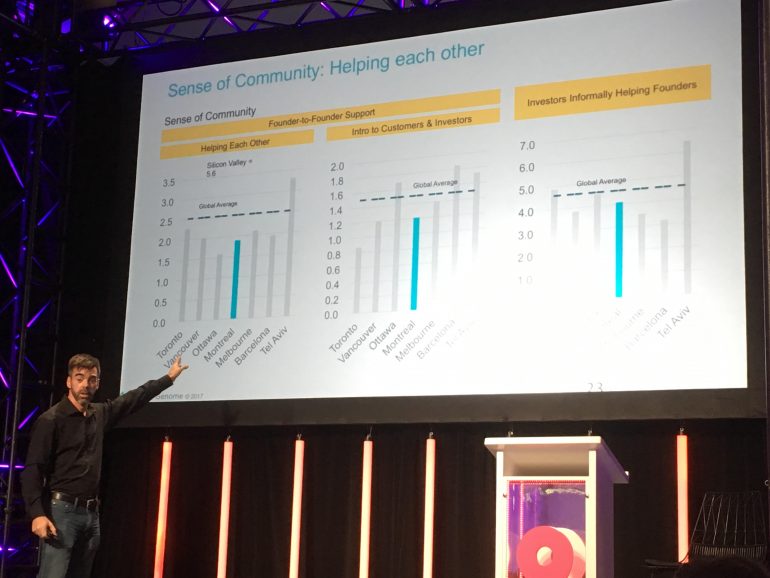Thursday morning at Startupfest Montreal kicked off with a State of the Nation presentation from Startup Genome CEO JF Gauthier, who debunked scaleup myths. Scaleup success is better broken down by city than by country, the most successful founders are those who are connected to networks of both local and global founders, and companies need global market reach early, he said.
According to research compiled from 20-minute interviews with more than 100,000 founders plus data from accelertors and incubators, Montreal, Vancouver, Waterloo and Toronto rank well behind Silicon Valley, but also Stockholm in terms of scaleups. Gauthier explained that the problem in Canadian cities is not going global as a community, by traveling, meeting other founders, and referring local founders to those they’ve met. Stockholm’s founders, however, understand the need to travel, meet other founders and support each other, he explained.
Start small and learn fast; simplicity always wins; and keep the long view.
Though some US cities have strong startup economies, countrywide stats are being buoyed by the bigger players – Silicon Valley and New York City. “Houston has a great economy, but they’re not creating scaleups. And how many unicorns have we heard from Dallas? Zero,” he said.
Gauthier also showed that big funding is needed to scale up, but funding is the effect, not the cause. Startups that go global early see their revenue grow twice as fast, making them deserving of a larger funding round and thereby producing more scaleups. To go global faster, the key is to connect with other founders, he said. “When all of us in a city are connected to others in a top ecosystem, which is San Francisco, New York, London, Berlin, Shanghai, Singapore, where there’s excess of knowledge, we go global much faster at an early stage.”
How to get acquired
Next up, VP M&A Integration of Facebook Lara Cumberland walked the audience through what companies can expect when being acquired. Cumberland, who worked on more than 100 deals at IBM, said the best deals with the strongest foundations for success are when it’s a two-way street that creates value for both parties.
“It’s wisdom to expect to be frustrated, but focus on keeping cool, asking for help and getting good advisors. And after close, it’s all about the emotional journey that the team has,” she said.
Since the acquirer is going through the trouble of integrating the acquisition into its company and the acquired company is trying to protect what it’s built, the best acquisitions are when the two companies have a shared visioneg. Negotiations go more smoothly and requests are more easily met.
“If you have a shared passion with the company that’s going to buy you, that’s going to take care of most things,” she said. “All your questions get answered in the context of this exciting vision together. If you don’t get that from someone who’s interested in buying you, what they’ll do with your app or team, then I’d walk away.”
Other advice from Cumberland included making sure you own your IP and not calling your acquirer constantly.
“How often should you call?” asked interviewer Alistair Croll of the company Solve for Interesting. “I think, use your good judgement. And most acquirers are pretty straight up if they’re not interested.”
Lessons for founders
In one of the final presentations of the morning, David Byttow, VP of product and engineering at Postmates walked the audience through the 11 to 14 lessons he learned from mentors over the course of his work as an employee at Medium, Square, and Google and as a founder of Secret (a company of three employees that was offered term sheets for Series A within weeks of launch, ended up raising $36 million within six months and shutting down six months later), Bold, and now Postmates.
"be succint, direct and kind." Sounds straightforward, but there is a lot more to it than it seems. @davidbyttow at #startupfest pic.twitter.com/406qSg1Fs2
— Claire Bourgeois (@claireinyyc) July 12, 2018
He pointed to the lessons learned from Jack Dorsey of Square: start small and learn fast; simplicity always wins; and keep the long view. “There was a time at Square when I was deciding to leave and so were some of the key engineers,” said Byttow. “I asked Jack how he was dealing with this and he said Square will be as big as Twitter one day. And that blew my mind. Square was at $3 or $4 billion, but I believed him. And they’re both roughly around the same value right now. If a competitor outpaces you and you don’t get the funding you want, keep the long view.”
From Vic Gundotra of Goodle, he learned to be succinct, direct and kind (“He was able to deliver harsh feedback, he wouldn’t sugar coat it, but he was always kind,” said Byttow).
And his own words of wisdom? “Always be coding. Today I lead a team of 35 people at Postmate. And I still find time to code four to six hours per day. It may not be the best use of my time, but it keeps me happy and relevant. I don’t care, CEO or not, it’s the one thing I need to keep.”


